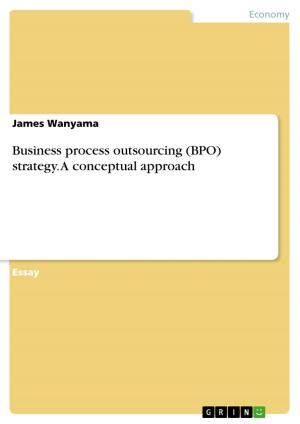Can career plans generate motivated and high-skilled workforce?
Business & Finance, Human Resources & Personnel Management| Author: | Sven Röhm | ISBN: | 9783638273329 |
| Publisher: | GRIN Publishing | Publication: | May 3, 2004 |
| Imprint: | GRIN Publishing | Language: | English |
| Author: | Sven Röhm |
| ISBN: | 9783638273329 |
| Publisher: | GRIN Publishing |
| Publication: | May 3, 2004 |
| Imprint: | GRIN Publishing |
| Language: | English |
Essay from the year 2003 in the subject Business economics - Personnel and Organisation, grade: 72%,1,3, A, University of Teesside (Business School), course: Managing Human Resources, language: English, abstract: Career plans, in the literature also referred to as 'training and development plans' or 'personal development plans' (PDP), are the reaction to a changing business world and social environment in theory. Bagshaw (1996: p.16) suggests that '...the dynamic people of today's dynamic world are attracted to jobs where they can see clear development for themselves, with opportunities spreading in all directions.' Accordingly, employees increasingly demand the possibility to develop themselves and their careers within the organisation. Employees who are able and willing to participate in development programmes should be more motivated and higher skilled than their 'non-developing' colleagues. These development programmes should provide a certain career satisfaction, which Gattiker and Larwood (1988) define as 'a stimulated response to career and work events' and significantly correlate with the employee's motivation. To create motivated and high-skilled workforce, some organisations introduced different approaches for a systematic career management. For example, external and internal trainings have been offered on a voluntary basis, annual performance appraisals have been implemented and chances for further education like Executive MBA courses have been pledged to promising staff. Thus, organisations seem to have understood that personal development of the employees is to a certain extent important to 'widen the pool of talents' (Taylor and Edge, 1997: p. 21). Development means gathering knowledge, which is suggested to be the 'only meaningful resource today' (Reynolds and Ablett, 1998: p. 26) that makes an organisation more productive and more competitive (Evans, 1998). In consequence, career plans are the most promising method of personal development within organisations, because they are supposed to combine the individual and organisational needs and visions. In theory, both parties are having equal rights in determining the success, the status quo and the required procedure for the future development.
Essay from the year 2003 in the subject Business economics - Personnel and Organisation, grade: 72%,1,3, A, University of Teesside (Business School), course: Managing Human Resources, language: English, abstract: Career plans, in the literature also referred to as 'training and development plans' or 'personal development plans' (PDP), are the reaction to a changing business world and social environment in theory. Bagshaw (1996: p.16) suggests that '...the dynamic people of today's dynamic world are attracted to jobs where they can see clear development for themselves, with opportunities spreading in all directions.' Accordingly, employees increasingly demand the possibility to develop themselves and their careers within the organisation. Employees who are able and willing to participate in development programmes should be more motivated and higher skilled than their 'non-developing' colleagues. These development programmes should provide a certain career satisfaction, which Gattiker and Larwood (1988) define as 'a stimulated response to career and work events' and significantly correlate with the employee's motivation. To create motivated and high-skilled workforce, some organisations introduced different approaches for a systematic career management. For example, external and internal trainings have been offered on a voluntary basis, annual performance appraisals have been implemented and chances for further education like Executive MBA courses have been pledged to promising staff. Thus, organisations seem to have understood that personal development of the employees is to a certain extent important to 'widen the pool of talents' (Taylor and Edge, 1997: p. 21). Development means gathering knowledge, which is suggested to be the 'only meaningful resource today' (Reynolds and Ablett, 1998: p. 26) that makes an organisation more productive and more competitive (Evans, 1998). In consequence, career plans are the most promising method of personal development within organisations, because they are supposed to combine the individual and organisational needs and visions. In theory, both parties are having equal rights in determining the success, the status quo and the required procedure for the future development.















